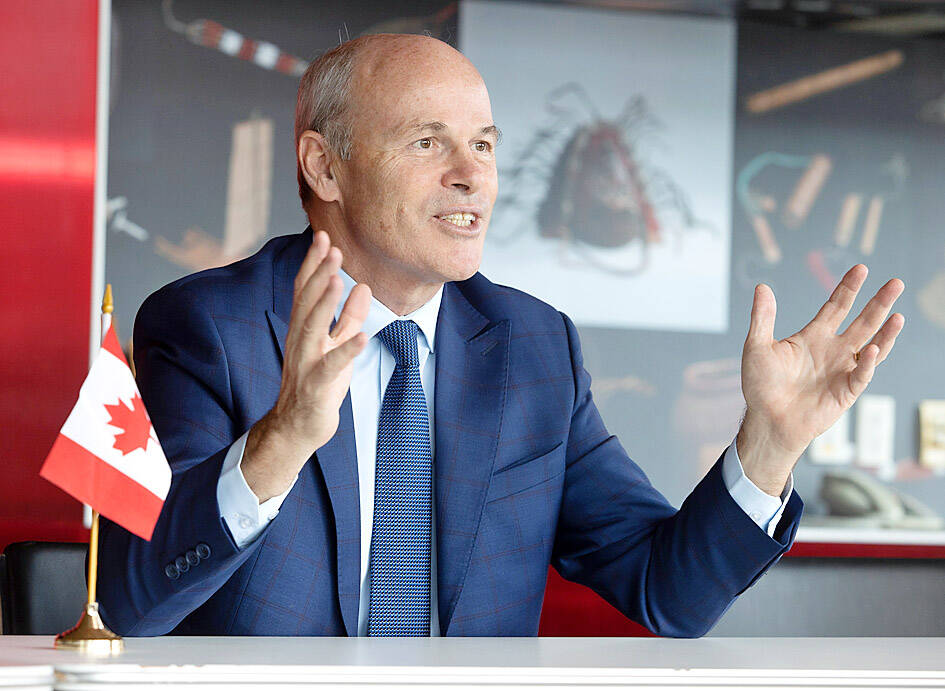Canada is opposed to the use of force to change the “status quo” in the Taiwan Strait, the country’s new representative to Taiwan said, reminding Beijing that invading Taiwan would not be in its interest.
In an interview on Thursday, Canadian Trade Office in Taipei Executive Director Jim Nickel said Canada shares the view of “all democratic societies, including Taiwan,” that the use of force to change the “status quo” is “completely unacceptable.”
“And I would be hopeful, too, that China would recognize and understand that the use of force against Taiwan would not be in China’s interest,” he said.

Photo: CNA
Concerns about the use of force have risen following China’s aggressive military maneuvers around Taiwan in August and the consolidation of power by Chinese President Xi Jinping (習近平) at the Chinese Communist Party’s (CCP) 20th National Congress.
US President Joe Biden has pledged to send troops to Taiwan in the event of a Chinese invasion, but when asked what Canada, a close ally of the US, would do in such a scenario, Nickel diplomatically sidestepped the question, calling it a “hypothetical situation.”
“I think our approach would be we would like to do what’s necessary to avoid that scenario,” Nickel said.
He said that the more important task at hand is how democratic societies can make a contribution, or at least be heard, to actually “preserve peace and stability and avoid the scenario.”
Nickel took over as head of the trade office, the de facto Canadian embassy in Taiwan in the absence of diplomatic ties, on Sept. 20.
A seasoned Canadian Foreign Service Officer, he most recently served as deputy head of mission at the Canadian embassy in Beijing, a post he had held since August 2018.
Nickel said he had not had the chance to visit Taiwan before and was “thrilled and honored” to be able to serve in Taipei, especially after his posting in Beijing.
“You know, obviously, sitting in the People’s Republic of China, we hear a lot about relations between Taiwan and the PRC [People’s Republic of China],” he said, adding that most of what he heard was from the CCP’s perspective.
“I was quite interested to come here and hear more from a Taiwanese perspective on this issue,” he said.
Asked if he was told why he was sent Taipei immediately after serving in Beijing, Nickel said he believed his two decades of experience in the region were likely the main reason, as Canada is preparing to release its own Indo-Pacific strategy.
“I would fully expect we’ll see a step-up in efforts by Canada in the Indo-Pacific region,” he said.
Nickel said he was hoping to do his utmost to enhance bilateral relations on all fronts, as people are beginning to resume overseas travel now that many COVID-19 restrictions have been lifted.
In terms of business and trade, he said he sees potential for growth in several fields given that the economic strengths of Canada and Taiwan are complementary.
Among the areas he identified as opportunities for greater engagement were renewable energy, communication technologies, life sciences, pharmaceuticals, healthcare, electric vehicles and semiconductors.

The Chinese military has built landing bridge ships designed to expand its amphibious options for a potential assault on Taiwan, but their combat effectiveness is limited due to their high vulnerability, a defense expert said in an analysis published on Monday. Shen Ming-shih (沈明室), a research fellow at the Institute for National Defense and Security Research, said that the deployment of such vessels as part of the Chinese People’s Liberation Army (PLA) Navy’s East Sea Fleet signals a strong focus on Taiwan. However, the ships are highly vulnerable to precision strikes, which means they could be destroyed before they achieve their intended

The Taiwan Experience Education Program (TEEP) has funded short-term internships in Taiwan for more than 4,500 young people from more than 40 countries since 2015, with the goal of attracting and retaining international talent, the Ministry of Education said yesterday. Fifty-five colleges launched 514 projects this year, including in fields such as semiconductors, artificial intelligence, medicine and biotechnology, green energy, and sustainability, it said. The program provides research and practical internships in Taiwan for two to six months, and offers cultural exchange and networking opportunities, the ministry said. For example, National Formosa University’s Embedded System and Autopilot Laboratory developed two solar-powered drones in

GLOBAL: Although Matsu has limited capacity for large numbers of domestic tourists, it would be a great high-end destination for international travelers, an official said Lienchiang County’s (Matsu) unique landscape and Cold War history give it great potential to be marketed as a destination for international travelers, Tourism Administration Director General Chen Yu-hsiu (陳玉秀) said at the weekend. Tourism officials traveled to the outlying island for the Matsu Biennial, an art festival that started on Friday to celebrate Matsu’s culture, history and landscape. Travelers to Matsu, which lies about 190km northwest of Taipei, must fly or take the state-run New Taima passenger ship. However, flights are often canceled during fog season from April to June. Chen spoke about her vision to promote Matsu as a tourist attraction in

Taipei resident Mu Chu-hua caught some glimpses of China’s mighty military parade on YouTube on Wednesday. As she watched hypersonic missiles roll down Beijing’s Changan Avenue and troops march in lockstep, she did not feel like they posed a threat to Taiwan. Mu, a 69-year-old retiree, said she saw the parade as simply a way for Chinese President Xi Jinping (習近平) to “say thank you to the troops.” “I thought it was quite normal,” she said. “It was very cool.” China’s military parade commemorating the end of World War II was being watched internationally for insights into Beijing’s military advances and its show